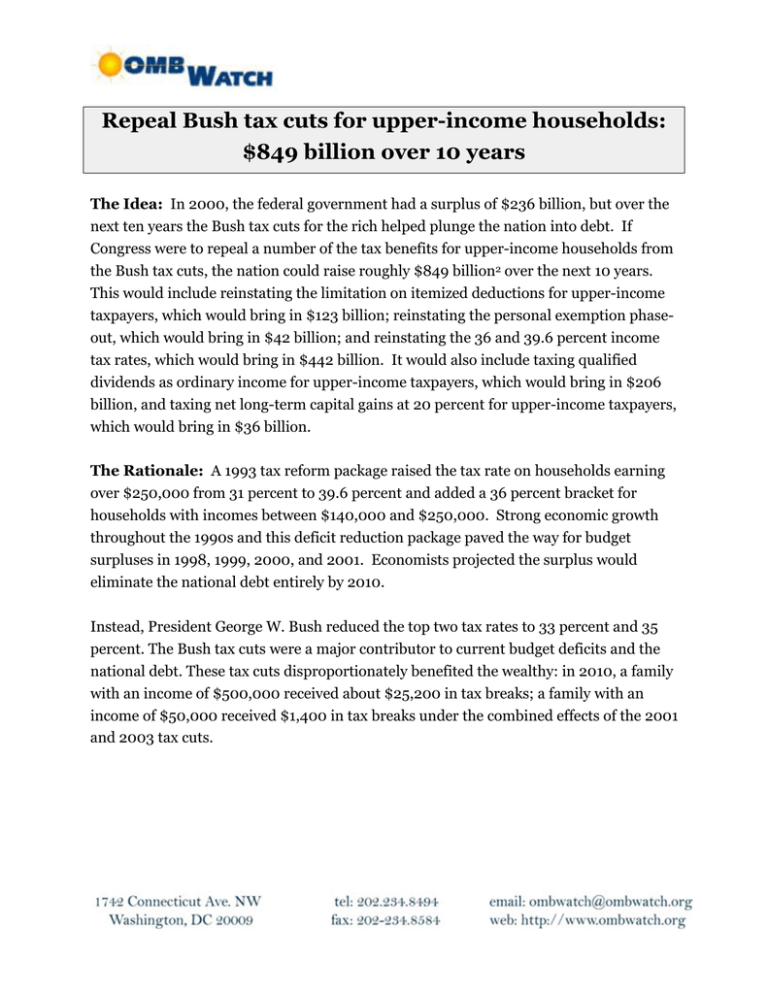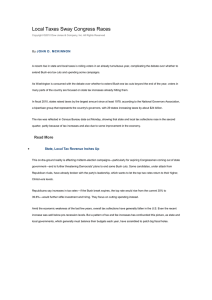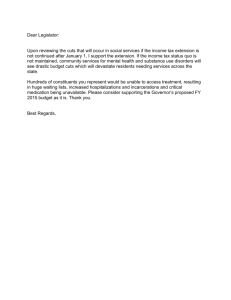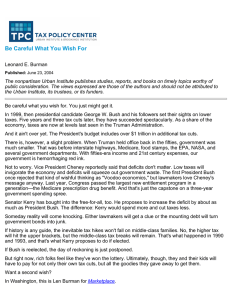Repeal Bush tax cuts for upper-income households: $849 billion
advertisement

Repeal Bush tax cuts for upper-income households: $849 billion over 10 years The Idea: In 2000, the federal government had a surplus of $236 billion, but over the next ten years the Bush tax cuts for the rich helped plunge the nation into debt. If Congress were to repeal a number of the tax benefits for upper-income households from the Bush tax cuts, the nation could raise roughly $849 billion2 over the next 10 years. This would include reinstating the limitation on itemized deductions for upper-income taxpayers, which would bring in $123 billion; reinstating the personal exemption phaseout, which would bring in $42 billion; and reinstating the 36 and 39.6 percent income tax rates, which would bring in $442 billion. It would also include taxing qualified dividends as ordinary income for upper-income taxpayers, which would bring in $206 billion, and taxing net long-term capital gains at 20 percent for upper-income taxpayers, which would bring in $36 billion. The Rationale: A 1993 tax reform package raised the tax rate on households earning over $250,000 from 31 percent to 39.6 percent and added a 36 percent bracket for households with incomes between $140,000 and $250,000. Strong economic growth throughout the 1990s and this deficit reduction package paved the way for budget surpluses in 1998, 1999, 2000, and 2001. Economists projected the surplus would eliminate the national debt entirely by 2010. Instead, President George W. Bush reduced the top two tax rates to 33 percent and 35 percent. The Bush tax cuts were a major contributor to current budget deficits and the national debt. These tax cuts disproportionately benefited the wealthy: in 2010, a family with an income of $500,000 received about $25,200 in tax breaks; a family with an income of $50,000 received $1,400 in tax breaks under the combined effects of the 2001 and 2003 tax cuts. If all the Bush-era tax cuts, including the middle-income cuts, were repealed, the deficit would be lowered by $3.7 trillion over ten years. Support for the Idea: President Obama has repeatedly called for Congress to abolish the upper-income tax cuts. However, the cut-off point has been a point of contention. Some only want to tax those with incomes over $1 million (see the millionaires surtax) while others propose a return to 1993 tax rates, which today would cover families earning more than $200,000 a year, or less than three percent of taxpayers. At the end of 2012, tax rates on all Americans are scheduled to revert to their 2001, or pre-Bush tax cut, levels. Of the plans reviewed for this revenue project, the following support restoring 2001 income tax rates on high-income households: Our Fiscal Security's (Economic Policy Institute, Demos, and The Century Foundation) Investing in America's Economy, Center for American Progress' First Step, the House Democratic 2012 budget, the Institute for America's Future Citizens' Commission, President Obama's 2012 budget and Living within Our Means, and the Congressional Progressive Caucus' People's Budget. Two plans propose to repeal immediately the top two Bush tax rates and allow the remaining Bush tax cuts to expire in 2012: the Congressional Progressive Caucus' People's Budget, and Comeback America's Restoring Fiscal Sanity. 2President Obama's Fiscal Year 2013 Budget, Office of Management and Budget, Summary Tables, pg. 219-20.



